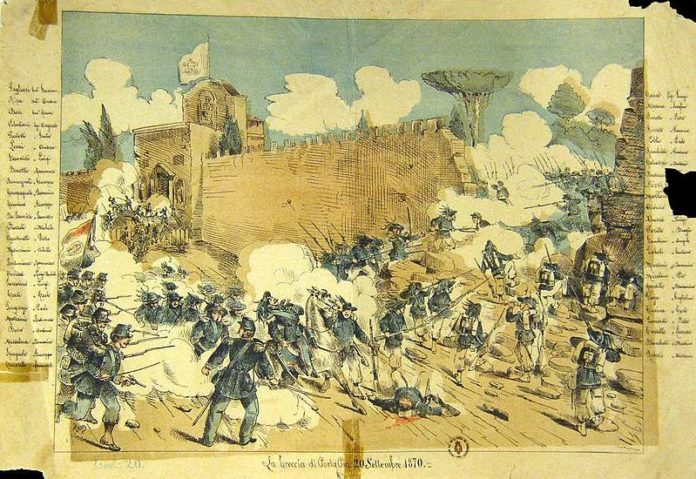Rome (NEV), 19 September 2020 – 150 years have passed since 20 September 1870, the date on which the Italian troops led by General Raffaele Cadorna entered Rome through a breach opened in the Aurelian walls near Porta Pia, determining the end of the temporal power of the popes.
Once the city of Rome had become a “national” space, the spreading of Protestant beliefs increased, just simply due to the fact that the papal guards could no longer prevent minorities from disseminating Bibles in Italian, at a time when the ritual Catholic liturgy was still in Latin.
After 150 years, there is still a lot to do for religious freedom and for secularism in Italian institutions. Daniele Garrone, pastor, biblical scholar, professor of the Old Testament Department of the Waldensian Faculty of Theology and member of the Council of the Federation of Proterstant Churches in Italy (FCEI), writes:
“The Italian evangelicals welcomed with favor and often with enthusiasm the breach of Porta Pia and the annexation of Rome to the Kingdom of Italy. It was possible for them to finally enter the city, as they did immediately, and begin their preaching there. Until 1870, the only Protestants who could stay in Rome without risk and even hold their cults were the employees of some foreign embassies, therefore in extra-territorial areas. Also the Jews saw the definitive end of the ghetto age only in 1870.
Todays’ Italian communities of “historical” Protestantism are, in large majority, the result of that missionary expansion in Italy, first during the Risorgimento and then as an unified State. On the legal level, nothing had been innovated – as for religion – since the time of the Albertine Statute (1848), but the new climate was used by Protestants to extend their presence and in a certain sense “to force” things towards a full religious freedom.
In recent years, with the signing of the Agreements between the State and other confessions other than the Catholic one, foreseen in art. 8 of the Republican Constitution, a new season started. At present the challenge is twofold: to complete religious freedom still marked by hesitation, and to defend, in a time of assertion of identity and of populism, the public space as a guarantee of equal rights for every citizen, regardless of his/her faith or atheism, conceptions and sexual orientation”.





























